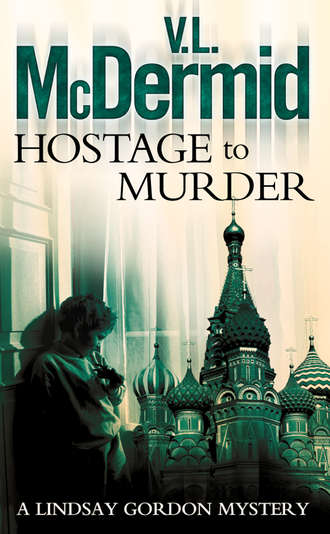
Полная версия
Hostage to Murder
‘Sandra, are you sure you’re not Jewish?’
Sandra gave her an affectionate punch in the ribs. ‘Fuck off, Rory. C’mon, let’s go and have a last dance and see if I can pick myself up some wee boy who wants to be initiated into the secret world of the older woman.’
Rory chuckled as she got to her feet. ‘And you’ve got the nerve to talk about me.’
Sandra rumpled Rory’s damp hair. ‘Difference is, I can do the serious thing just as well as I do the playing.’ She pushed past and made for the stairs leading to the main dance floor, entirely missing the momentary flash of sadness and longing that crossed Rory’s face.
The raw cold ate into Kevin’s bones. Michael seemed oblivious to the weather, as affected by the penetrating damp as were the concrete and glass of the primary school they were watching. The school was near the Botanic Gardens, in a quiet side street lined with tall sandstone tenements, which posed something of a problem for them. There was no convenient bus shelter or phone box to use as a surveillance point. Nor was there a handy café with windows overlooking the school entrance. And in these days of paedophile paranoia, nothing would provoke a call to the police faster than two men standing on a street corner scrutinizing the children arriving at a primary school.
If it had been up to Kevin, they would have gone back to bed after their preliminary reconnaissance at half past seven had demonstrated how apparently impossible was the task facing them. But this was the school nearest the supermarket where Bernadette Dooley had been spotted, so they had to start here, Michael decreed. And besides, he had spent long enough on the front line to have honed his improvisational skills. As they had walked up Byres Road towards the school, he’d noticed two youths by the Underground entrance handing out copies of a free newspaper to the commuters hurrying into the station. When he realized how exposed the school was from a surveillance point of view, he’d remembered the newspaper distributors.
He’d marched Kevin back down to the station and gone into a huddle with the youths. A threatening look from his amber eyes would probably have been enough to achieve his goal, but Michael didn’t want to be fixed in anyone’s memory as a bad lad. Not just yet, anyway. So a couple of tenners were swapped for two bundles of freesheets and they walked back to the school, where they took up position at either side of the gates, handing out the paper to teachers and parents as they arrived.
Nobody gave them a second look.
‘Won’t she recognize you?’ Kevin had asked as they’d walked back.
In reply, Michael had taken a pair of glasses from his inside pocket. They had thick black frames and lenses tinted blue. He put them on and simultaneously let his shoulders slump. In that instant, the threat disappeared like the sun behind a cloud.
‘No, right, I see what you mean,’ Kevin muttered.
Now, he watched how Michael scrutinized every face that approached. When the electric bell finally sounded on the dot of nine o’clock, he was satisfied that Bernadette Dooley was not among the parents who had delivered their offspring to Botanics Primary.
‘So what do we do now?’ Kevin asked forlornly, clutching the leftover newspapers to his chest.
‘We go and see if that supermarket’s got a café,’ Michael said. ‘And if it hasn’t, we find someplace to watch it from. And this afternoon we find another primary school at chucking-out time.’ He was already striding down the street.
Two hours and forty-three minutes later, Kevin shifted in his plastic chair. ‘She’s giving us funny looks, that woman on the till,’ he muttered.
Michael scowled. ‘You’re too fucking obvious, that’s why.’ He glanced at his watch. Three teas each and a couple of bacon butties. The worst part was not being able to smoke. No, Michael corrected himself. The worst part was having to work with a fucking eejit like Kevin who could no more blend into the background than a naked woman at High Mass.
‘I’m not doing anything,’ Kevin whined.
Michael bit back a vicious response. He sipped his lukewarm tea. ‘Away and get me a fresh cup of tea. And when you’ve done that, you can go into the supermarket and buy me some bananas.’
‘Bananas?’ Kevin frowned in puzzlement.
‘They’re a good source of potassium. Just do it, Kevin.’
Kevin pushed himself up from the table. He strolled over to the counter, his attempt at nonchalance setting the till operator’s antennae jangling. She couldn’t figure out his game at all, but she was mentally rehearsing his description. When he returned with the tea, Michael said, ‘Fine. Now the bananas, there’s a good lad. And take your time about it. Have a browse. See if there’s any new flavours of Pot Noodle to get you excited.’ The sarcasm was wasted on Kevin, who shrugged and walked off to join the milling shoppers.
Left to himself, Michael pulled out his mobile and called Patrick. ‘It’s me,’ he said as soon as they were connected. ‘So far, no joy.’
‘I didn’t expect anything so soon.’ Patrick’s voice was flat, unreadable. ‘Stay on it. Call me tomorrow.’
The line went dead. Whatever Bernadette had taken from Patrick, it had clearly pissed the man off more than Michael would have risked lightly. He put the phone back in his pocket and continued his scrutiny of the entrance to the store. Barely taking his eyes off the harassed mothers and the slow-moving pensioners who made up most of the clientele at that time of the morning, he sugared his tea and began to drink it. This was probably a total waste of time, but they had nothing else to chase. As long as Patrick was willing to spend his money, Michael was content to watch and wait.
Time ticked inexorably past and still Kevin didn’t return. He was probably memorizing the Pot Noodle flavours, Michael reckoned. Then suddenly all thoughts of Kevin disappeared. He went immobile as a lizard that knows it’s been spotted and still hopes its camouflage will keep it safe.
It was her. Pushing past an elderly couple, dark hair swinging round her head in a long bob, heavy coat wrapped round her, disguising a figure that Michael remembered had always been worth noticing. Bernadette Dooley was hurrying into the supermarket, making straight for the counter that sold cigarettes, confectionery and lottery tickets.
If he leaned over in his seat, he could see her back view. She was scrabbling in her bag for her purse, pulling it out, opening it, taking out a couple of notes. She handed over the money and received a carton of 100 Silk Cut in return. Then she was turning away, pushing the cigarettes into her bag, head down, making for the door again.
Michael was on his feet. By the time she made it to the street, he was a handful of steps behind her. He glanced quickly over his shoulder. Where the fuck was Kevin? Ah, the hell with it. Bernadette was the important one. Kevin would doubtless sit in the supermarket till it closed. Either that or he’d have the sense to make his way back to where they were staying. Wouldn’t he?
Bernadette turned right out of the store and headed down Byres Road. The pavements were busy enough to give him cover. With the total focus of the hunter whose oblivious prey is well upwind and living on borrowed time, Michael began stalking Bernadette Dooley.
Rory was already settled into her booth at Café Virginia when Lindsay arrived. ‘Hey,’ she greeted her, ‘You look worse than I do, and I was clubbing till gone three.’
Lindsay squeezed out a vague smile. ‘I was up half the night. And not in a good way.’
‘Must have been something you ate, eh?’
‘Must have been. So, what’s doing?’
Rory pushed a manila folder across the table as Lindsay’s cappuccino arrived. ‘Take a look at that.’
Curious, Lindsay studied the contents. The first page was a memo to herself from Rory:
Tip re Keillor/Kilwinning. CCD, the multinational pharmaceutical and agrichemical company, have a small plant on the outskirts of Kilwinning. Just over a year ago, local farmer sells biggish chunk of land to a suit from down south, who says he wants to retire and do rare-breed sheep. Few months later, planning application goes in for change of use from agricultural to light industrial. Turns out land now belongs to CCD; they want to expand in unspecified ways to extend their research. Locals convinced they’re going to be poisoned with chemicals or overrun with cloned sheep. Think the local plan will keep them safe. But Chief Planning Officer David Keillor leans heavy on councillors and the change of use goes through. Source tells me that Keillor is running round in a brand-new BMW 4x4 – costs about a year’s salary new – and his wife has a neat wee Porsche Boxster. Source also tells me that vehicles were originally registered to CCD.
The other documents were reports of the planning committee meetings and transcriptions of Rory’s interviews with the farmer who sold the land and various locals with an axe to grind.
Lindsay digested the material then looked up and said, ‘And?’
‘Well, obviously, we need to get a look at the vehicle registration document for Keillor’s Beamer.’
Lindsay nodded. ‘Obviously. So what’s been keeping you?’
The sarcasm was gentle enough for Rory to grin. ‘Keillor knows me. We had a wee bit of a head to head a few years ago when he was working for the city planning department. Something to do with selling off school playing fields. So there’s no way I can get close enough. I thought maybe you’d have an idea how we could pull it off?’
Lindsay scooped the froth off her coffee and slowly licked it off the spoon. ‘How bent do you want to get?’ she asked thoughtfully.
Rory scratched an eyebrow. ‘Run it past me.’
‘Do you happen to know if Strathclyde Police have changed their warrant cards in the past two years?’
Before Rory could answer, Sandra breezed up to their table. ‘Hiya, girls.’ She inclined her head towards Lindsay. ‘You must be Splash Gordon.’ She thrust a hand out. ‘I’m Sandra Singh. I’m supposed to be this one’s best pal.’ Lindsay took the offered handshake with a nod.
Rory gave an exasperated little smile. ‘Lindsay, meet Sandra. Sandra is a factual programmes producer/director up the road at STV. She hates her boss, she likes boys that are barely old enough to shave and she thinks that, since my mammy’s dead, she should poke her nose into my business all the time.’
Lindsay moved up the bench to make room for Sandra. ‘Good to meet you. It’s nice to know there’s somewhere I can go to get the dirt if I need an edge.’
Sandra shook her head at the available seat. ‘I’m not stopping. I was passing and I thought I’d say hello. You girls plotting?’
Lindsay said, ‘Yes,’ at the precise moment Rory said, ‘No.’
‘I’ll take that as a yes, and leave you to it. Catch you later.’ With a wave of her slender fingers, Sandra was off.
Rory raised her eyes heavenwards. ‘Something else.’
‘Clearly. So, do you have an answer?’
Rory looked momentarily bewildered. ‘An answer?’
‘Warrant cards.’
‘Right. Eh, not as far as I know. Why?’
‘I think this comes into the category of what you don’t know can’t hurt you. Have you got an address for Keillor? There isn’t one in the file.’
Rory dug around in her backpack and produced a battered filofax. She rummaged inside and finally unearthed a torn scrap of paper. She tore a sheet out of the notebook on the table and scribbled down an address in Milngavie. ‘You sure you don’t want to talk it through?’ she said almost wistfully as she handed it over.
‘I’m sure. If it all goes horribly wrong, at least you’ll be able to put your hand on your heart and say it was nothing to do with you.’
‘Well, damn,’ Rory said. ‘Haven’t you figured out yet that I like trouble?’
‘All the more reason not to tell you what I’ve got in mind,’ Lindsay said drily. ‘I can get into enough trouble for both of us, all by myself.’
Rory grinned. ‘Oh good. You know, I think we’re going to be pure dead brilliant together.’
Lindsay’s smile didn’t make it to her eyes. It wasn’t so long ago that she would have said the same thing about her and Sophie. Now, she really wasn’t sure any more.
7
Bernie Gourlay took the washing out of the tumble drier and began to fold it. She noticed that one of Jack’s school sweatshirts had begun to split at the shoulder seam and put it to one side to sew up later. She often heard mothers complaining about the things they had to do for their kids, but she’d never once felt like that. She knew what a miracle he was, and she counted it a privilege to be able to take care of the details of his life. She’d been conscious ever since he’d been placed in her arms that his dependency on her would wane consistently as he grew older, and she’d determined then that she would enjoy every moment, every phase of his development, but that she’d let go when she had to.
She was, she thought, the luckiest person she knew. She’d escaped from a life that was difficult and anxious, and, although the journey hadn’t been without its ups and downs, now she’d achieved something she’d never have believed possible. Happiness. Jack was growing strong and healthy, a cheerful child whose face never seemed crossed with shadows. And she had Tam. Big, daft, lovely Tam who had swept her off her feet and never minded that Jack was another man’s son, nor that she was incapable of having more children by him. Tam, who had bought this beautiful big garden flat for them to live in, who saw to it that none of them ever went without, who worked hard to take care of them all but who never let his business interfere with enjoying his family to the full.
Bernie glanced at the clock. Ten minutes before she had to leave and pick up Jack from school. Tam sometimes dropped him off in the mornings, but she always made sure she was there in plenty of time to pick him up. She couldn’t bear the thought of him standing at the school gates, worry at her lateness puckering his face and darkening his china-blue eyes. Soon enough, he’d be begging her to let him walk home with his pals, but for now he was still pleased to see her when the bell went.
The electronic chirrup of the phone disturbed her cheerful thoughts. Probably Tam, she thought, reaching for the handset. It was seldom that a day passed without him calling just to say hello. Four years married, and he was still a big soft romantic at heart.
But the voice that insinuated its way into her brain wasn’t Tam’s. It was a voice she’d often prayed she would never hear again. It was a voice whose very tone was a masquerade, disguising the viciousness behind it with a beguiling softness. Bernie wasn’t beguiled. She was terrified. She felt as if a block of ice was dissolving in her stomach, sending cold trickles through her whole body. She clung to the phone, mesmerized, unable to put it down even after the line went dead.
Staggering slightly, she collapsed into a kitchen chair. Tears pricked her eyes and her dry lips trembled. Eventually, she got to her feet, still shaky. Although she had prayed she’d never have to put it into action, she had a contingency plan in place. She took a well-worn leather address book from a kitchen drawer and looked up an unfamiliar number. She keyed it into the phone and waited for the international connection. When the phone was answered, she gave the name of the person she desperately needed to talk to. Another pause. Then Bernie closed her eyes with relief. ‘It’s Bernadette,’ she said. Please God, let this work.
Late the following afternoon, Lindsay drove out through the south side of the city towards the prosperous suburb of Milngavie. She never failed to be struck by the contrasts in Glasgow, even between areas that superficially seemed to have much in common. The average income in Milngavie was probably only marginally above that in the smart part of the West End where she and Sophie lived. But, culturally, it felt like a different world. The West End had traditionally been more genteel, drawing its residents from the academics at the university and the medical staff at the city’s hospitals. Now, it had added media, IT professionals and the arts to the mix, making it a place where Lindsay felt as at home as she was ever going to be.
But Milngavie had always felt more culturally barren. The money here came from retail empires, from accountants, from people who preferred Andrew Lloyd Webber to Mozart or the Manic Street Preachers. The difference was obvious to her even in the architecture. This was the land of bungalows and detached houses, where to inhabit a semi was somehow to have failed. There was nothing here to compare with the grandeur of the red sandstone tenements of Hyndland or the imposing houses of Kelvinside. Lindsay knew she was indulging her prejudices with such facile thoughts, but she didn’t care. From everything she’d read about David Keillor, she’d have been astonished to find him living anywhere else.
She turned into the quiet side street where Keillor lived and cruised slowly down till she spotted his house. It was a two-storey detached property in a decent-sized garden, a double garage tacked on to one side. The brilliant white harling that covered the house looked as if it had recently been repainted, and the double glazing was the expensive sort that mimicked traditional sash windows. It didn’t look as if Keillor was strapped for cash. She parked a little way past the entrance to his drive and settled back to wait.
She’d borrowed Sophie’s car for the afternoon, knowing that the anonymous saloon her lover drove was more appropriate for what she had in mind than the classic MGB roadster she’d bought on her return to the UK. Sophie had teased her about having a mid-life crisis, but Lindsay had pointed out that she had always driven classic cars and because she’d previously owned an MGB she knew enough to carry out her own maintenance. Since she couldn’t hope to do that with a modern car crammed with electronics, she was effectively choosing the budget option, she’d argued. Sophie had just laughed and kissed her.
If she has a baby, I’ll have to ditch the MGB, Lindsay thought sourly. She knew Sophie well enough to realize that no child of hers would be allowed on the narrow bench seat in the rear of the 1974 sports car lest it fly into the air and disappear from the rear-view mirror, bouncing down the motorway. Her life would have to change in far more profound ways, she knew that. But today what rankled was the potential loss of her car. She knew she was being childish, but she was the only person who knew that, so it didn’t count.
Lindsay forced herself to stop thinking about the baby and concentrate instead on what she had to do. She dug into her jacket pocket and took out the small black leather wallet with the Strathclyde Police crest on it. A couple of years before, she’d been instrumental in saving an American friend, Meredith Miller, from facing a murder charge. A few weeks later, the fake warrant card had arrived in the post, along with a brief note: ‘You’re better than the real thing. I thought this might amuse you. Thanks, Meredith.’ She’d never imagined using it; but then she’d never imagined being a journalist again, particularly not in Scotland.
She adjusted her rear-view mirror so she could see approaching traffic and settled down for a wait. She didn’t expect it to be too long. Officials like David Keillor left the office on time. It was only their minions who had to stay late to deal with their workloads. With luck, he’d be home very soon. She wanted to hit him as soon as he got out of the car, catch him on the back foot before he could settle in to his normal evening routine.
Lindsay had guessed right. A mere twenty minutes after she’d arrived, a black 4x4 BMW rolled into sight. As the electronically operated gates opened to allow the car to enter, she was on the pavement, walking briskly on to the herringbone brick of Keillor’s driveway. His face swung towards her, a look of suspicious surprise narrowing his eyes.
Конец ознакомительного фрагмента.
Текст предоставлен ООО «ЛитРес».
Прочитайте эту книгу целиком, купив полную легальную версию на ЛитРес.
Безопасно оплатить книгу можно банковской картой Visa, MasterCard, Maestro, со счета мобильного телефона, с платежного терминала, в салоне МТС или Связной, через PayPal, WebMoney, Яндекс.Деньги, QIWI Кошелек, бонусными картами или другим удобным Вам способом.







